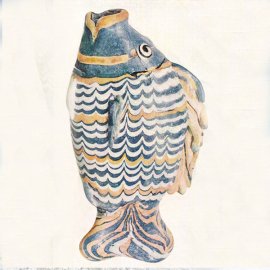Poetry Says It Best
-
English
-
ListenPause
WOR 415 Poetry Says It Best I’m Peter Neill, Director of the World Ocean Observatory. Poetry says it best. Writing for World Ocean Radio involves describing policies and projects in specific detail, journalistically correct but not always as evocative as can be. Sometimes the more emotional and abstract observations do better at making the point by realizing the acuity of an experience. I have been teaching a seminar on “American Sea Writing” with readings drawn from an anthology by the same title that I edited in 2000 for the Library of America, New York, as an alternative to similar compendia of mostly British authors and experience. The course has been focused on identifying and hearing unique American voices and narratives related to ocean passage and coastal observation. The approaches and themes are many – among them, the ocean as metaphor, as place apart and psychological space, the storm as epic event, exploration and the naming of places and things, voluntary and involuntary immigration, sea power in relation to imperial expansion and the opening of trade, the coast and life on the edge, women at sea, diversity and integration of crews, the log as personal journal, the voyage as a story of coming of age, acculturation through maritime exchange of goods and ideas, the building of an American ideal, survival and death and the transforming nature of life, the Pilot and the hand of God. It is a very rich story indeed, a wonderful cacophony of distinct voices and a perspective on the history of the United States that is not often identified and shared. Here is a poem from that collection, “The Fish” by Marianne Moore (1887-1972), first published in 1918, that, as described in my introductory note, “renders the profusion of undersea life with her characteristic detachment and attentiveness. However precise, the poem is also alert to the less tangible presence of the ocean, its unseen essence of force and motion. Out of the immediacy of the aquatic world emerges a vision of the sea in all its battered, timeless grandeur.” The Fish wade through black jade Of the crow-blue mussel-shells, one keeps adjusting the ash heaps; opening and shutting itself like an injured fan. The barnacles which encrust the side of the wave, cannot hide there for the submerged shafts of the sun, split like spun glass, move themselves with spotlight swiftness into the crevices– in and out, illuminating the turquoise sea of bodies. The water drives a wedge of iron through the iron edge of the cliff; whereupon the stars, pink rice-grains, ink- bespattered jelly-fish, crabs like green lilies, and submarine toadstools, slide each on the other. All external marks of abuse are present on this defiant edifice– all the physical features of ac- cident–lack of cornice, dynamite grooves, burns, and hatchet strokes, these things stand out on it; the chasm-side is dead. Repeated evidence has proved that it can live on what can not revive its youth. The sea grows old in it. We will discuss these issues, and more, in future editions of World Ocean Radio. - - - WORLD OCEAN RADIO IS A PROJECT OF THE WORLD OCEAN OBSERVATORY IN ASSOCIATION WITH WERU-FM, BLUE HILL, MAINE. WORLD OCEAN RADIO IS DISTRIBUTED BY THE PUBLIC RADIO EXCHANGE AND THE PACIFICA NETWORK. FIND OUR PODCAST ON ITUNES AND AT WORLD OCEAN OBSERVATORY DOT ORG.
In this week's episode of World Ocean Radio, host Peter Neill reads "The Fish," a poem by Marianne Moore from a collection entitled "American Sea Writing: A Literary Anthology“ which contains unique writings of American voices and experiences related to ocean passage and coastal observation.
About World Ocean Radio
Peter Neill, Director of the World Ocean Observatory and host of World Ocean Radio, provides coverage of a broad spectrum of ocean issues from science and education to advocacy and exemplary projects. World Ocean Radio, a project of the World Ocean Observatory, is a weekly series of five-minute audio essays available for syndicated use at no cost by college and community radio stations worldwide. A selection of episodes is now available in Portuguese, Spanish, French, Swahili, and Mandarin, enabling us to reach 75% of the world's population. For more information, visit WorldOceanObservatory.org/world-ocean-radio-global.
Image Credit
“Polychrome Vase in the Form of a Fish”
British Museum Postcard
El-Amarma, XVIIIth Dynasty, (c. 1365 BC)
Glass. 1.2 3/4″
The British Museum, London
Resources from this Episode
< American Sea Writing: A Literary Anthology
< Marianne Moore, "The Fish" | Poets.org
- Login to post comments



